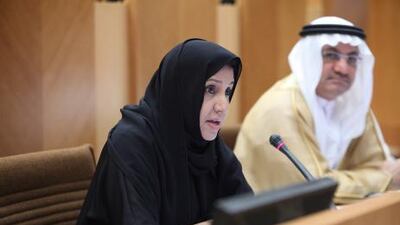ABU DHABI // The rising cost of weddings and dowries is to blame for more Emirati women marrying later in life, a government minister said yesterday.
But Dr Maitha Al Shamsi, the Minister of State and chair of the Marriage Fund, said the ministry still had no single definition of Anousa (spinsters), nor any figures for how many there were.
Calling parents to ask how many of their daughters were past the age of marriage was impracticable, she told the FNC, and the Fund's information was limited to the group weddings it hosts, and awareness campaigns.
"We did a study on the relation between the cost of marriage and Anousa, and found a direct link," the minister said. The study found 78 per cent of nationals believed the expense of weddings and dowries led girls to delay marriage.
Musabah Al Kitbi (Sharjah) said: "The problem of Anousa is known, now Emirati girls grow up and don't get married. "here are statistics from several universities, and I believe they are close to reality."
He said many girls were becoming westernised and preferred to go to work or university, while Emirati men wanted brides between the ages of 18 and 25.
He said between 60 to 68 per cent of girls were not getting married, and the result was about 175,000 spinsters.
Many families believe they will be protected by requiring a second dowry to be paid if a couple divorced. That, too, caused problems, he said.
"We need a national plan to tackle this," he said. He called for a new nationwide study based on Emirates IDs, if the minister did not believe the figures already available.
But Dr Al Shamsi insisted that would be invalid. "We do not know all the national population, so we cannot speak to every family to know ages, who can marry and who can not," she said.
The Marriage Fund alone could not solve the problem, she said, as it deals only with families asking for financial support for marriage. Other entities, including schools, universities and the general women's union, had a role to play. "We need statistics and more support from other policymakers."
Mr Al Kitbi said there were unmarried girls in every Emirati family. "This is a reality and we are living it," he said.
Dr Ali Al Nuaimi (Ajman) suggested the Fund should be opened to private donors, but Dr Al Shamsi said there was no need to add to the fund's Dh204 million annual grant from the government.
"Getting donations from outside is not within our plan," she said.

